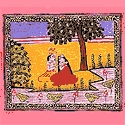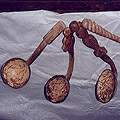With the disintegration of patronage to paintings in the Mughal Court of Aurangzeb artists moved to wider fields of patronage; with further migrations in number after the fall of Delhi in 1739 to the Persian ruler Nadir Shah. This thus initiated the development of the Pahari – Hill style – the Pahari kalam school of miniature art. The princely Himalayan hill state kingdoms of Nurpur, Chamba, Basohli, Guler, Kangra, Mandi, Kullu and Bilaspur provided the patronage. In keeping with their patrons demands the themes of Pahari miniatures had strong religious and spiritual undertones and included scenes from the Hindu epics of the Ramayana and Mahabharata, the Gita Govinda , the Bhagvata Purana, episodes from the lives of Radha and God Krishna.Tales and legends were also painted all contextualized within the Pahari landscape using mineral or stone colours and painted on handmade paper, the paintings on completion were burnished by rubbing the back with an agate stone. The tools and styles remain similar till today.
Gallery
YOUR VIEWS
PRACTITIONERS: INDIA
Access 70,000+ practitioners in 2500+ crafts across India.
BIBLIOGRAPHY
10,000+ listings on arts, crafts, design, heritage, culture etc.
GLOSSARY
Rich and often unfamiliar vocabulary of crafts and textiles.
SHOP at India InCH
Needs to be written.






